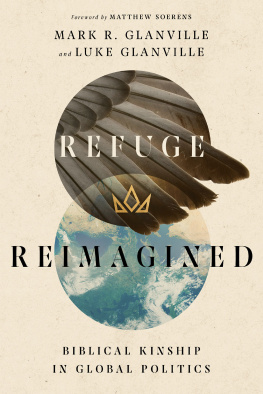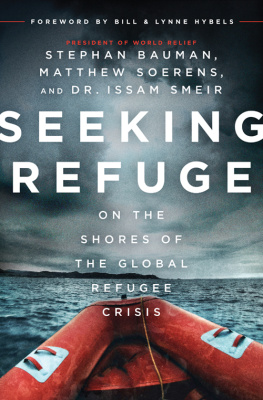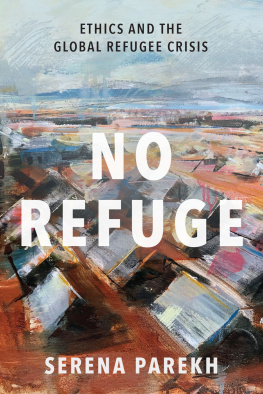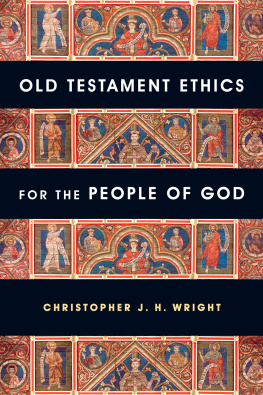Sommaire
Pagination de l'dition papier
Guide
MARK R. GLANVILLE
and LUKE GLANVILLE
BIBLICAL KINSHIP
IN GLOBAL POLITICS
Foreword by MATTHEW SOERENS
InterVarsity Press
P.O. Box 1400, Downers Grove, IL 60515-1426
ivpress.com
2021 by Mark R. Glanville and Luke Glanville
All rights reserved. No part of this book may be reproduced in any form without written permission from InterVarsity Press.
InterVarsity Press is the book-publishing division of InterVarsity Christian Fellowship/USA, a movement of students and faculty active on campus at hundreds of universities, colleges, and schools of nursing in the United States of America, and a member movement of the International Fellowship of Evangelical Students. For information about local and regional activities, visit intervarsity.org.
Scripture quotations, unless otherwise noted, are from the New Revised Standard Version Bible, copyright 1989 National Council of the Churches of Christ in the United States of America. Used by permission. All rights
reserved worldwide.
Portions of the introduction and chapter seven draw on Luke Glanville, Hypocritical Inhospitality: The Global Refugee Crisis inthe Light of History, Ethics & International Affairs 33, no. 4 (2020): 3-12. Used with permission.
The publisher can't verify the accuracy of website hyperlinks beyond the date of print publication.
Cover design and image composite: David Fassett
Images: gold textured background: Katsumi Murouchi / Moment Collection / Getty Images
cardstock texture: Zakharova_Natalia / iStock / Getty Images Plus
grey bird wing: Grafissimo / E+ / Getty Images
illustration of the earth from space: SCIEPRO/SCIENCE PHOTO LIBRARY / Getty Images
ISBN 978-0-8308-5382-3 (digital)
ISBN 978-0-8308-5381-6 (print)
This digital document has been produced by Nord Compo.
For Mum
FOREWORD
MATTHEW SOERENS
HOSPITALITY IS A MISUNDERSTOOD VIRTUE. At least in contemporary English, we tend to speak of hospitality as having friends over for a particularly extravagant meal, or making sure a guest room is clean for visiting relatives. Others might think of hospitality primarily in the context of an industry: hotels, restaurants, cruise ships and theme parks.
But when the Apostle Paul commands the people of God to practice hospitality (Rom 12:13) and insists that leaders in the church must be hospitable (1 Tim 3:2, Titus 1:8), he was not talking about showing attentiveness to ones friends, family or customers, but rather to strangers. Philoxenialiterally, the love of strangersis precisely the opposite of xenophobia, the fear of strangers.
So it is entirely appropriate that Christians of various traditions (including myself) have applied the various biblical commands to welcome the stranger to contemporary debates around refugees and immigration.
Hospitality is certainly an important first step. But as theologian Soong-Chan Rah observes, We need to move from hostility, to hospitality, and then to household... to becoming family. When we welcome strangers well, they do not remain strangers: we quickly recognize them as neighbors and ultimately embrace them as a part of us.
Christiansespecially those of us who do not share Jesus Jewish ancestryhave a greater reason than anyone to embrace others as a part of our family. Ephesians 2 describes how Gentile believers were once separate from Christ, excluded from citizenship in Israel and foreigners to the covenants of the promise, without hope and without God in the world (Eph 2:12). But through Christs death and resurrection, we have been naturalized into Gods kingdom and adopted into his family: fellow citizens with Gods people and also members of his household (Eph 2:19). Having been sanctified by Gods grace, Jesus is not ashamed to call [us] brothers and sisters (Heb 2:11). Having been welcomed in by Gods grace, we are called to welcome othersnot merely as guests but as family.
Indeed, as Mark and Luke Glanville argue persuasively, that has been Gods design throughout the Scriptures, from the Pentateuchwhere Yahweh instructs his people to integrate the vulnerable stranger in vivid detailto the Gospels, where Jesus consistently cares for those on the margins of society and explicitly redefines family to include those beyond those sharing a biological connection.
Interwoven throughout this biblical exegesis are practical, contemporary examples of the church in various parts of the world embracing refugees and other immigrants as kin. Many of these stories come from the community of Kinbrace in Vancouver, where for decades Canadian Christians have been welcoming refugee claimants (what Americans would call asylum seekers) and providing housing, practical support andmost importantlylove.
From there, Mark and Luke ask how these biblical principles could and should be applied not just to individuals or congregations but to states, building a case for public policies that integrate a much greater number of refugees. In the midst of a season when my country, the United States, has dramatically retreated from its historic leadership role in refugee resettlement, with various other countries following its lead, the worlds refugeessome of the most vulnerable people on our globedesperately need the church to influence public policy, pointing to a better way.
At its best, the church already knows how to do this. In the Spanish-speaking congregation where my family and I worshipwhere most of our congregation has come from Mexico or Central America, and were the minority as native-English-speaking, US-born non-LatinosIm always warmly greeted as hermano. At first, I suspected this was just a convenient way to obscure that someone had forgotten my name, but in time it became clear that I was fully embraced as a part of this family. Were kin, and we take every opportunity possible to sit down for a shared meal.
It grieves me that, too often, Christians have seen refugees and other immigrants as a potential threat, heeding often-inaccurate rumors rather than the consistent commands of Scripture. Having been embraced by those with life experiences very different than my own, I want to extend that same embrace to others, which I am convinced presents a vital opportunity for the church to join God in his mission. I pray that this carefully considered book will point the way forward.
ACKNOWLEDGMENTS
CHRIST SAID THAT IN welcoming the stranger we welcome Christ himself (Mt 25:3540). So, we want to thank those newcomers who have been Christ to us, welcoming us into their lives, shaping our minds, and allowing us to share some of their stories with you, especially Sahel and her daughter and Ral Gatica.
Friends who work and advocate in solidarity with refugees have deeply shaped this book. In these pages you will meet many of the staff and volunteers at Kinbrace Community Society. From Kinbrace we thank in particular Loren Balisky, Anika Barlow, Emily Parsons Dickau, Fran Gallo, and Adriana Zepeda. Emily and Anika gave us feedback on the full manuscript of the book. Other advocates have allowed us to share their stories and insights. We are indebted to Jarrod McKenna, Mary Kaech, Ebony Birchall, Jim Mullins, and Adam Estle. Your faith and life are inspiring.











